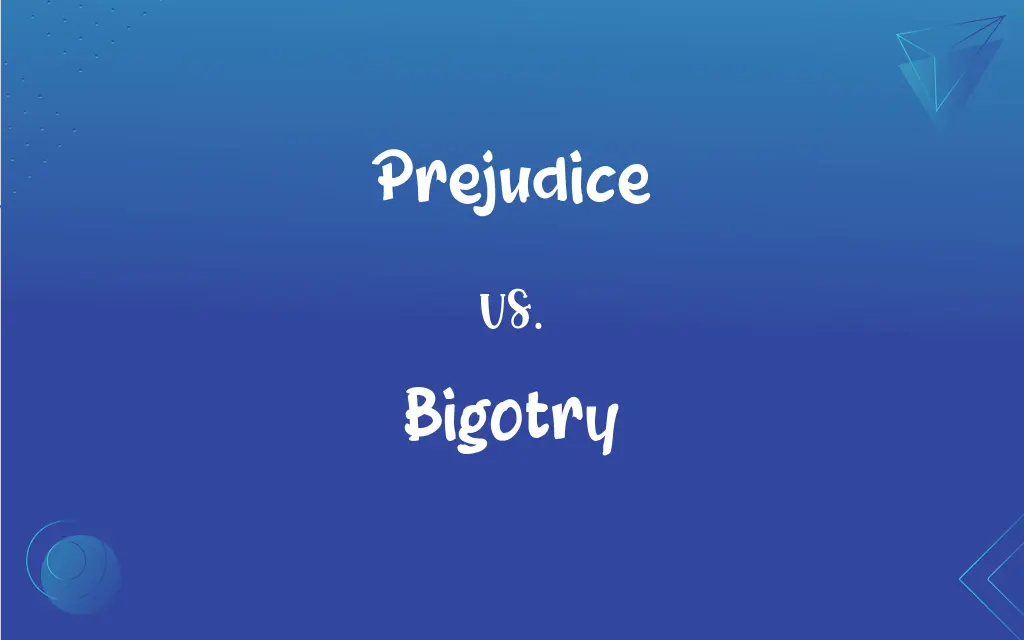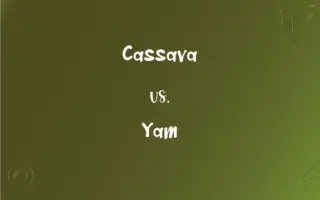Prejudice vs. Bigotry: What's the Difference?
Edited by Harlon Moss || By Janet White || Updated on October 20, 2023
Prejudice is a preconceived opinion not based on reason, while bigotry is intolerant devotion to one's own beliefs and prejudices.

Key Differences
Prejudice, by definition, refers to a preconceived opinion or judgment without proper reason or actual experience. Bigotry, on the other hand, dives deeper into intolerance, displaying an obstinate allegiance to one's own opinions and an unreasonable bias against those who differ.
While both words, prejudice and bigotry, highlight negative human tendencies, the emphasis varies. Prejudice leans towards a premature judgment or bias, while bigotry is characterized by a stubborn and complete refusal to accept differing views.
Interestingly, prejudice can be both positive and negative, like forming a good first impression without reason. Bigotry, conversely, is always negative, signifying an unreasonable adherence to a single viewpoint and a refusal to respect diversity.
One might argue that prejudice can be unconscious, stemming from societal or cultural influences. Bigotry, however, is often more conscious and deliberate, showcasing a more rigid mindset and staunch resistance against change or acceptance.
In essence, while prejudice might make one form an opinion without a proper basis, bigotry ensures that such opinions are held onto, even in the face of contradicting evidence or reason, with intolerance towards others.
ADVERTISEMENT
Comparison Chart
Definition
Preconceived opinion without proper reason.
Intolerant devotion to one's beliefs and biases.
Intensity
Can be less intense.
Typically more intense and stubborn.
Awareness
Can be unconscious.
Often conscious and deliberate.
Range
Can be positive or negative.
Predominantly negative.
Acceptance of Different Views
Might not actively deny other perspectives but doesn't base on reason.
Actively denies and disrespects other views.
ADVERTISEMENT
Prejudice and Bigotry Definitions
Prejudice
An unjustified or incorrect attitude towards an individual based on their group.
Their prejudice against outsiders often led to misunderstandings.
Bigotry
Stubborn intolerance to any group outside one's own.
His bigotry prevented him from appreciating global cultures.
Prejudice
An irrational aversion or preference rooted in one's background or experiences.
Due to a past experience, her prejudice against big cities was evident.
Bigotry
Extreme prejudice and strong biases against specific groups.
The rise in bigotry in some parts of the country alarmed human rights activists.
Prejudice
An adverse opinion formed about a group without direct knowledge.
His prejudice against certain foods stemmed from cultural influences.
Bigotry
A mindset of superiority and discrimination against those different from oneself.
Educational campaigns aimed to break walls of ignorance and bigotry.
Prejudice
A bias or predisposition in favor or against something or someone.
The judge's prejudice towards celebrities raised concerns about a fair trial.
Bigotry
Unyielding and obstinate attachment to one's beliefs and prejudices.
The town's bigotry towards outsiders was legendary and unwelcoming.
Prejudice
The act or state of holding unreasonable preconceived judgments or convictions
“This is not actually a volume of the best short stories … These are just the stories that I like best, and I am full of prejudice and strong opinions” (Ann Patchett).
Bigotry
A rigid perspective that resists acceptance or respect for diversity.
The old leader's bigotry stood in stark contrast to the younger generation's open-mindedness.
Prejudice
An adverse judgment or opinion formed unfairly or without knowledge of the facts
A boy with a prejudice against unfamiliar foods.
Bigotry
The attitude, state of mind, or behavior characteristic of a bigot; intolerance.
Prejudice
Irrational suspicion or hatred of a particular social group, such as a race or the adherents of a religion.
Bigotry
Characteristic qualities of a bigot: (especially religious, anti-religious or racial) intolerant prejudice, opinionatedness, or fanaticism; fanatic intolerance.
Prejudice
Detriment or harm caused to a person, especially in a legal case
The delay operated to her prejudice.
Bigotry
(dated) Obstinate prejudice or opinionatedness.
Prejudice
Preclusionary effect, preventing further pursuit of one's interests
The case was dismissed with prejudice.
Bigotry
The state of mind of a bigot; obstinate and unreasoning attachment of one's own belief and opinions, with narrow-minded intolerance of beliefs opposed to them.
Prejudice
To fill with prejudice or cause to judge with prejudice
My rural upbringing has prejudiced me against living in the city.
Bigotry
The practice or tenets of a bigot.
Prejudice
To affect detrimentally or harmfully by a judgment or act
Negative media coverage prejudiced people's opinion of the mayor.
Bigotry
The intolerance and prejudice of a bigot
Prejudice
(countable) An adverse judgment or opinion formed beforehand or without knowledge of the facts.
Prejudice
(countable) A preconception, any preconceived opinion or feeling, whether positive or negative.
Prejudice
(countable) An irrational hostile attitude, fear or hatred towards a particular group, race or religion.
I am free of all prejudices. I hate everyone equally.
Prejudice
(obsolete) Knowledge formed in advance; foresight, presaging.
Prejudice
Mischief; hurt; damage; injury; detriment.
Prejudice
(transitive) To have a negative impact on (someone's position, chances etc.).
Prejudice
(transitive) To cause prejudice in; to bias the mind of.
Prejudice
Misspelling of prejudiced
Prejudice
Foresight.
Naught might hinder his quick prejudize.
Prejudice
An opinion or judgment formed without due examination; prejudgment; a leaning toward one side of a question from other considerations than those belonging to it; an unreasonable predilection for, or objection against, anything; especially, an opinion or leaning adverse to anything, without just grounds, or before sufficient knowledge.
Though often misled by prejudice and passion, he was emphatically an honest man.
Prejudice
A bias on the part of judge, juror, or witness which interferes with fairness of judgment.
Prejudice
Mischief; hurt; damage; injury; detriment.
England and France might, through their amity,Breed him some prejudice.
Prejudice
To cause to have prejudice; to prepossess with opinions formed without due knowledge or examination; to bias the mind of, by hasty and incorrect notions; to give an unreasonable bent to, as to one side or the other of a cause; as, to prejudice a critic or a juryman.
Suffer not any beloved study to prejudice your mind so far as to despise all other learning.
Prejudice
To obstruct or injure by prejudices, or by previous bias of the mind; hence, generally, to hurt; to damage; to injure; to impair; as, to prejudice a good cause.
Seek how may prejudice the foe.
Prejudice
A partiality that prevents objective consideration of an issue or situation
Prejudice
Disadvantage by prejudice
Prejudice
Influence (somebody's) opinion in advance
Prejudice
A premature judgment formed without adequate information.
Her prejudice against new employees made her skeptical about their abilities.
FAQs
How can one combat prejudice?
By gaining knowledge, understanding, and challenging one's own biases.
Can prejudice be positive?
Yes, people can have positive prejudices, like thinking well of someone without reason.
Is bigotry always evident in actions?
While bigotry often manifests in actions, it fundamentally lies in one's mindset and beliefs.
Can someone be unaware of their prejudices?
Yes, prejudices can be implicit or unconscious.
Is bigotry a learned behavior?
Bigotry is often learned from societal influences, upbringing, or personal experiences.
Are there laws against bigotry?
Many countries have anti-discrimination laws that combat acts stemming from bigotry.
What is prejudice rooted in?
Prejudice often stems from lack of knowledge, stereotypes, or societal influences.
What makes bigotry harmful?
Bigotry's intolerance can lead to discrimination, hate crimes, and societal divisions.
How are bigotry and prejudice linked?
Bigotry is a more entrenched form of prejudice with active intolerance.
Can institutions display prejudice?
Yes, institutions can have systemic prejudices that affect their functioning.
How does bigotry impact global relations?
Bigotry can strain diplomatic relations and hinder multicultural cooperation.
Is bigotry just about race?
No, bigotry can relate to race, religion, nationality, gender, or any other group distinction.
Can education combat bigotry?
Education promotes understanding and can be a powerful tool against bigotry.
Can societies function with widespread prejudice?
Societies can function, but prejudice often leads to injustice and lack of harmony.
Can prejudice exist without stereotypes?
While they often go hand in hand, prejudice can exist independently based on other biases.
Does prejudice always lead to discrimination?
Not always, but unchecked prejudice can manifest as discriminatory actions.
What's a common misconception about bigotry?
That it's only a product of ignorance; sometimes, it's a conscious choice.
Can societies overcome deeply ingrained bigotry?
With effort, education, and understanding, societies can challenge and reduce bigotry.
Can media perpetuate prejudice?
Yes, media can reinforce stereotypes and spread prejudiced views.
Are children naturally prejudiced?
Children can display biases, but these are often learned from their environment.
About Author
Written by
Janet WhiteJanet White has been an esteemed writer and blogger for Difference Wiki. Holding a Master's degree in Science and Medical Journalism from the prestigious Boston University, she has consistently demonstrated her expertise and passion for her field. When she's not immersed in her work, Janet relishes her time exercising, delving into a good book, and cherishing moments with friends and family.
Edited by
Harlon MossHarlon is a seasoned quality moderator and accomplished content writer for Difference Wiki. An alumnus of the prestigious University of California, he earned his degree in Computer Science. Leveraging his academic background, Harlon brings a meticulous and informed perspective to his work, ensuring content accuracy and excellence.








































































